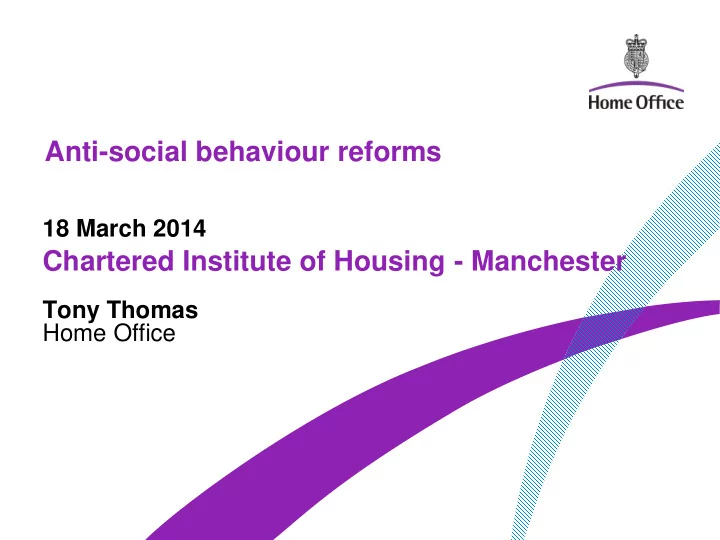

Anti-social behaviour reforms 18 March 2014 Chartered Institute of Housing - Manchester Tony Thomas Home Office
Reducing ASB is a priority • A Coalition Commitment • In 2011 we consulted on the current system • In May 2012, we published our White Paper “Putting Victims First: More effective responses to anti -social behaviour .” – Lack of flexibility in the current powers – Not enough focus on the victim – A need for more partnership working in complex cases
Getting the legislation right • The draft ASB Bill was published in December 2012 and underwent pre- legislative scrutiny by the Home Affairs Select Committee. • In addition, the Home Office took the draft clauses out on the road, running workshops and seminars with hundreds of police officers, council workers and social landlords to ensure the legislation was right. • A number of changes were made a result, including: – Introducing a ‘back stop’ to the Community Trigger – Introducing a maximum length of 12 months on an injunction for under 18s – Ensuring police dispersals are signed off by an Inspector – Numerous technical amendments as a result of comments by professionals
Getting the Bill through Parliament • We introduced the ASB, Crime and Policing Bill on 9 May and received an unopposed Second Reading on 10 June. • Public Bill Committee considered the Bill clause by clause in June and July, making only a couple of small alterations. • Changes were reversed at Report Stage and the Bill exited the Commons on 16 October. • Lords to began their scrutiny in October with Committee hearings in November. • Report Stage in January saw a number of amendments, including a change to the test for the injunction inspired by Lord Dear. • A compromise was agreed and the Bill was amended at Third Reading on 27 January. Changes were considered by the Commons on 4 February and Royal Assent is expected shortly.
The new toolkit Anti-Social Behaviour Order ASBO on Conviction Drinking Banning Order Civil injunction DBO on Conviction Criminal Behaviour Order Anti-Social Behaviour Injunction Individual Support Order Intervention Order Litter Clearing Notice Street Litter Clearing Notice Graffiti/Defacement Removal Notice Designated Public Place Order Gating Order Community Protection Notice Dog Control Order Public Spaces Protection Order ASB Premises Closure Order New Closure Power Crack House Closure Order Noisy Premises Closure Order Section 161 Closure Order Section 30 Dispersal Order Dispersal Powers Section 27 Direction to Leave
Tackling problem individuals Anti-Social Behaviour Order ASBO on Conviction Drinking Banning Order Civil injunction DBO on Conviction Criminal Behaviour Order Anti-Social Behaviour Injunction Individual Support Order Intervention Order The new civil injunction is a civil injunction available in the County Court for adults and the Youth Court for under 18s. The Criminal Behaviour Order (CBO) will be available to deal with the most seriously anti-social individuals on conviction for any criminal offence. As well as prohibitions, both the injunction and CBO will be able to include positive requirements that can address the underlying causes of the behaviour and prevent future recurrences (for instance, alcohol or drugs misuse).
Tackling Environmental ASB Litter Clearing Notice Street Litter Clearing Notice Graffiti/Defacement Removal Notice Designated Public Place Order Gating Order Community Protection Notice Dog Control Order Public Spaces Protection Order ASB Premises Closure Order New Closure Power Crack House Closure Order Noisy Premises Closure Order Section 161 Closure Order The Community Protection Notice (CPN) can be issued to deal with a particular problem negatively affecting the community (eg litter or graffiti) The Public Spaces Protection Order (PSPO) will provide councils with a flexible power to put in place local restrictions to address a range of ASB in public places The new Closure Power will provide the police or council with new, simpler, closure powers, consolidating four of the powers already available to them.
Police Powers to Disperse Section 30 Dispersal Order Dispersal Powers Section 27 Direction to Leave The police Dispersal Power will enable officers to require a person whose behaviour has caused, or is likely to cause, harassment, alarm or distress to leave a specified area and not return for a specified period of up to 48 hours.
Empowering communities The Community Trigger will give victims of ASB the opportunity to force a case review where their report meets a locally determined threshold. We have worked with a number of areas to trial the trigger and a Summary Report of the main lessons identified was published last May. Since then, a number of other areas have begun their own trials. The Community Remedy will give victims of low-level crime and ASB a say in the punishment of offenders out of court. This means victims will get justice quickly, and the offender has to face immediate and meaningful consequences for their actions. Punishments could include the offender signing an acceptable behaviour contract, paying compensation to the victim, or doing local unpaid work in the community, or for the victim, such as repairing damage or scrubbing graffiti off a wall.
Guidance • We have published draft guidance alongside the Bill for the ASB provisions. • This guidance provides the police, councils and landlords with some further information on the new powers. However, how and when to use the powers must still be a local decision. • We are taking the draft guidance out on the road as we did with the draft legislation to test it with the people who will use it. • We want to know what works now and how you envisage using the new powers in the future. • An updated version of the guidance will be published before commencement.
Recommend
More recommend